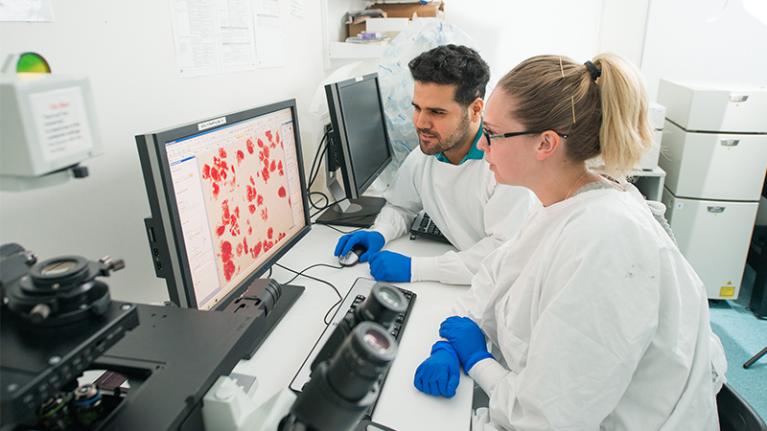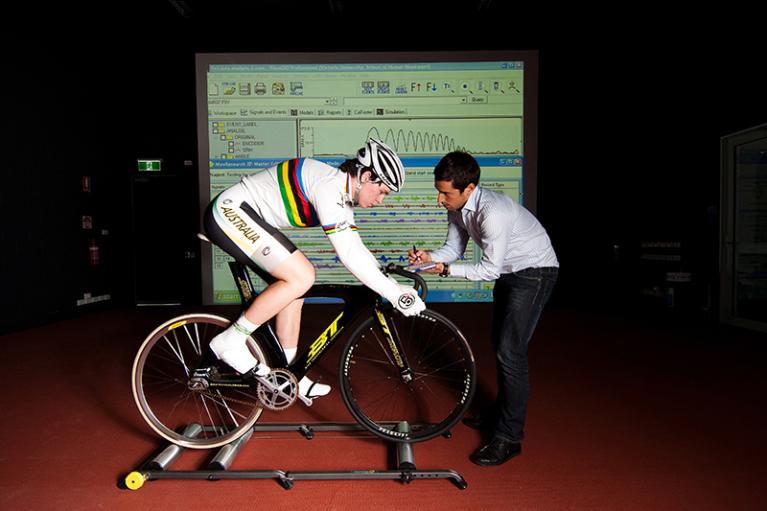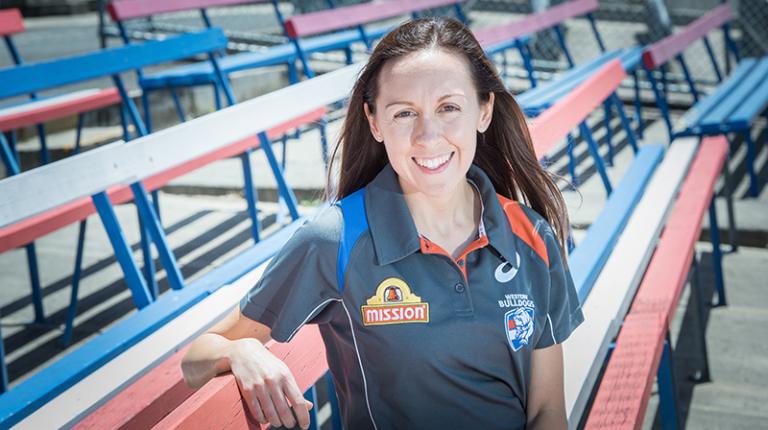Overview
Undertake your PhD at a world-leading research institute. Victoria University provides expert supervision in a wide range of disciplines.
Studying within our Institute for Health and Sport (IHES), you'll discover extraordinary opportunities to conduct research into the health, fitness and wellbeing of communities and individuals.
You'll develop best-practice research methods, and complete an original doctoral thesis at the forefront of its field. You'll also acquire the advanced skills needed to present your findings in publications and at conferences.
Victoria University conducts highly-ranked research:
- We are world number 7 for sport science education (ShanghaiRankings).
- We are ranked 'well above' world-standard in sport and health fields (Excellence in Research for Australia).
Our cross-disciplinary approach allows for broad research opportunities, aligned with our focus areas. Within IHES you may study towards a qualification in a range of disciplines, including business, medical sciences, nursing, psychology, society and culture, and sport.
Specialise in your area of passion and personal interest within our research programs, which incorporate:
- mechanisms and interventions in health and disease
- clinical and community health and wellbeing
- inclusive and healthy communities - sport, physical activity and culture
- sport performance.
Further opportunities exist to complete your PhD in our sister research centre, the Institute for Sustainable Industries & Liveable Cities.
World-class facilities
Sport & fitness
Our $68 million high-technology sport and exercise science research facilities include:
- altitude hotel
- biomechanics laboratories
- exercise physiology laboratories
- exercise rehabilitation laboratories
- motor control and biofeedback laboratories
- motor learning and skilled performance laboratories
- sport and exercise biochemistry laboratories.
Health & wellbeing
This $51.6 million five-level Western Centre for Health Research and Education building at Sunshine Hospital provides cutting-edge education, research and training facilities. Clinical trials area include:
- consulting rooms
- gait and balance gym
- falls and fracture clinic
- bone and muscle imaging (DXA and pQCT)
- metabolic testing.
Science labs
Our research centre at Werribee campus offers the latest technology for food analysis and scientific research.
We have labs dedicated the full range of science topics, including:
- cell culture and PC2 facilities
- biotechnology
- biochemistry
- biomedicine
- small-animal testing
- imaging research
- novel therapeutics testing.
Libraries & special collections
The VU Library holds several special collections and archives that are available to assist graduate students and staff in their research.
Partnerships & collaboration
VU has partnerships and collaborations with dozens of public institutions, health organisations and private sporting bodies.
We also work with other universities to provide the highest-level expertise and resources for our students.
Our partners include the following, among many others:
- AFL Australia
- Athletics Australia
- Australian Institute for Musculoskeletal Science (AIMSS)
- Australian Institute of Sport
- Australian Sports Commission
- Diabetes Australia Research Trust
- Headspace, the national youth mental health foundation
- National Heart Foundation
- Tennis Australia
- Turning Point Australia
- University of Melbourne
- Western Bulldogs
- Western Centre for Health Research and Education (WCHRE)
View the full list of partnerships on the Institute for Health & Sport page.
Research scholarships for PhD students
We offer various research scholarships for our PhD students. Victoria University has several generous research scholarships for successful applicants.
There are also externally funded scholarships from dozens of organisations, some of which are aimed at postgraduate students.
Research opportunities & development
VU Research gives you opportunities to:
- connect with other researchers
- participate in research festivals and competitions
- develop your research skills
- get funding for your research
- publish and promote your findings.
We offer support for graduate researchers including:
- an orientation program
- a specialised Graduate Research School
- study spaces
- units to help you conceptualise and contextualise your research
- research ambassadors and student association.
Find out more about graduate opportunities at VU.
Study in your chosen discipline
Within IHES you may study towards a qualification in your chosen area:
- business
- human movement
- medical and biological sciences
- nursing and midwifery
- psychology
- science
- social work
- society and culture
- sport and recreation.
Careers in academia, government and private sector
Following your PhD, you’ll be ready for a research or management career in the private or public sectors, or to become an academic. These are usually high-level roles, and paid accordingly.
Visit Labour Market Insights (government website) for more information about potential salaries as:
Course structure
To attain the Doctor of Philosophy students will be required to complete the below mentioned components consisting of:
-
Required coursework units to a minimum of an average standard of 70% or have approved advanced standing for the unit(s)
- A Research Thesis unit and have had their thesis classified by a Victoria University Academic Review Panel
- Two elective units (ROP8003, ROP8004) are available to post Confirmation of Candidature students to provide doctoral industry internships.
Course structure and units
Coursework Units
-
- Unit code
- ROP8001
-
- Unit code
- ROP8002
Thesis Units
Business
-
- Unit code
- BBM8001
Creative Arts
-
- Unit code
- ACR8001
Education
-
- Unit code
- EED8001
Engineering
-
- Unit code
- NEN8001
Food Science
-
- Unit code
- HFS8001
Human Movement
-
- Unit code
- SHM8003
Information Technology
-
- Unit code
- NIM8001
Law and Justice
-
- Unit code
- LLW8001
Medical and Biological Sciences
-
- Unit code
- HMB8001
Nursing and Midwifery
-
- Unit code
- HNM8003
Psychology
-
- Unit code
- APS8002
Science
-
- Unit code
- NCS8001
Society and Culture
-
- Unit code
- ASC8001
Sport and Recreation
-
- Unit code
- SSR8003
Elective Units
-
- Unit code
- ROP8003
-
- Unit code
- ROP8004
Learning outcomes
On successful completion of this course, students will be able to:
| 1. | engage in critical reflection, synthesis and evaluation; | ||
| 2. | develop, adapt and implement research methodologies to extend and redefine existing knowledge or professional practice; | ||
| 3. | disseminate and promote new insights to peers and the community; and | ||
| 4. | generate original knowledge and understanding to make a substantial contribution to a discipline or area of professional practice. |
What's a unit?
A unit or 'subject' is the actual class you'll attend in the process of completing a course.
Most courses have a mixture of compulsory 'core' units that you need to take and optional elective units that you can choose to take based on your area of interest, expertise or experience.
Credits
Each unit is worth a set amount of study credits based on the amount of time you study. Generally, 1 credit is equal to 1 hour of study per week.
Admission & pathways
Meeting the minimum admission requirements does not guarantee you entry into this course. Some courses receive more applications than the number of places available. In this situation we will also assess your education, work and other relevant experience.
If you do not meet the minimum requirements you may be eligible for one of our special admission programs. We also encourage you to explore our study pathways to help you reach your goal.
Find out more about how to apply for our courses, and our commitment to admissions transparency.
Entry requirements
Completion of an Australian Bachelor Honours Degree (AQF8), or equivalent, in a similar discipline to the proposed research with average grades of at least H2A/Distinction (70% or above on the Victoria University grading scale) for the final year
OR
Completion of an Australian Masters degree (AQF9), or equivalent, in a similar discipline and undertaken by a combination of coursework and a thesis with average grades of at least H2A/Distinction (70% or above on the Victoria University grading scale). The output produced from the thesis must have been undertaken solely by the applicant and examined externally to the supervisory/advisory team, but this need not be external to the University where they completed the degree.
OR
Completion of an Australian Masters research degree (AQF9), or equivalent in a similar discipline with average grades of at least H2A/Distinction (70% or above on the Victoria University grading scale)
OR
Completion of an equivalent combination of academic and research achievements such as relevant industry experience, research experience evidenced by peer review publications or the completion of a high-level research project in a similar discipline to the proposed research deemed to be equivalent to any of the above entry requirements.
Pathways from VU courses
There are many ways you can start your education journey at VU. Pathways offer an easy transition between courses at different levels, so that you can start with a certificate and progress right through to postgraduate study.
Find out more about pathways and credits.
Credit for skills and past study
Use our credit calculator to find out how much credit you could get towards your course, based on your previous study.
If you have completed study with another university or institution and believe you are eligible to receive credit for skills and past study, you can apply for advanced standing.
Applications for advanced standing can be made after a discussion with your course chair or academic adviser.
Additional information
Coursework is undertaken on the Footscray Park campus.
How to apply
Available start dates:
- 1 January 2026
- 1 July 2026
Before you apply
Before applying, you should consider whether you also want to apply for:
- Special admission programs: Depending on your life circumstances you may be eligible for special consideration of your application.
- Advanced standing: If you have significant experience or studies elsewhere you may be eligible for credit for some units of your course and not have to undertake them.
Find out more about applying for our courses.
Apply direct to VU
Direct applications open 9 February 2026.
Already a VU student?
If you are already a VU student, apply direct to VU using our Admissions centre to transfer into this course. Remember it’s best to be accepted into your new course before withdrawing from your current one.
After you apply
- It’s important to check for emails from us (which may go to your spam/junk folder).
- Complete any requests for information by the given dates, otherwise your application may not be considered
You will need to follow the six steps to becoming a research student.
Contact the Office for Researcher Training, Quality & Integrity on +61 3 9919 4522 or email apply.research@vu.edu.au if you require further information.
Enquire now
Please fill out the form below, and we'll get back to you shortly.
Get help
- Visit a student service centre
- 1300 VIC UNI (1300 842 864)
- Request a call back
- Visit the glossary
At Victoria University, we aim to display accurate and complete course information online. However, we are unable to guarantee that every course change is currently displayed. You may contact the University directly on +61 3 9919 6100 to confirm the most up-to-date course fees, pathways and credit transfer, recognition of prior learning, admission and enrolment procedures, examinations and services available to our students.





